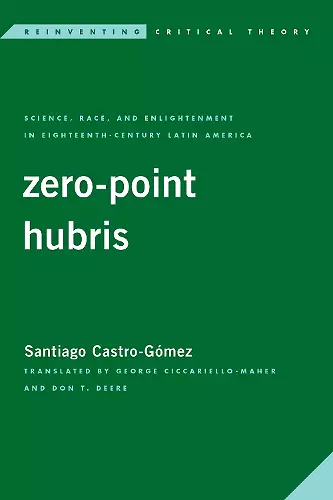Zero-Point Hubris
Science, Race, and Enlightenment in Eighteenth-Century Latin America
Santiago Castro-Gómez author George Ciccariello-Maher translator Don T Deere translator
Format:Paperback
Publisher:Bloomsbury Publishing PLC
Published:16th Dec '21
Currently unavailable, and unfortunately no date known when it will be back

Operating within the framework of postcolonial studies and decolonial theory, this important work starts from the assumption that the violence exercised by European colonialism was not only physical and economic, but also ‘epistemic’. Santiago Castro-Gómez argues that toward the end of the eighteenth century, this epistemic violence of the Spanish Empire assumed a specific form: zero-point hubris. The ‘many forms of knowing’ were integrated into a chronological hierarchy in which scientific-enlightened knowledge appears at the highest point on the cognitive scale, while all other epistemes are seen as constituting its past. Enlightened criollo thinkers did not hesitate to situate the Black, Indigenous, and mestizo peoples of New Granada in the lowest position on this cognitive scale. Castro-Gómez argues that in the colonial periphery of the Spanish Americas, Enlightenment constituted not only the position of epistemic distance separating science from all other knowledges, but also the position of ethnic distance separating the criollos from the ‘castes’. Epistemic violence—and not only physical violence—is thereby found at the very origin of Colombian nationality.
With its focus on bio-politics and the creation of an imperial science, Zero-Point Hubris takes decolonial theory to the next level. By focusing on the practices of coloniality in Latin America, Castro-Gómez troubles the rigidity of the binary between center and periphery. He shows how Criollo elites in Latin America fashioned a distinctive form of whiteness, naturalizing inequality and their own privilege. This is a critically important work. -- Linda Martín Alcoff, professor of philosophy, City University of New York
Santiago Castro-Gómez is undoubtedly one of the most original Latin American philosophers of the last two decades. Through a series of brilliant books, some of which are finally appearing in English, he has carved a distinct path between the historicizing history of ideas (which gave us Latinamericanism) and an ontologizing decolonial theorizing (which gave us the coloniality of power). Provincializing and localizing the genealogical method Castro-Gómez has forged a powerful analytical method that focuses on epistemic, governmentality, and racializing practices and regimes that renders legible the dialectics between coloniality and modernity. After Zero-Point Hubris we can talk about decolonizing genealogies and we will have to read both Immanuel Kant and Michel Foucault differently. -- Eduardo Mendieta, Pennsylvania State University
ISBN: 9781786613776
Dimensions: 219mm x 154mm x 21mm
Weight: 535g
330 pages